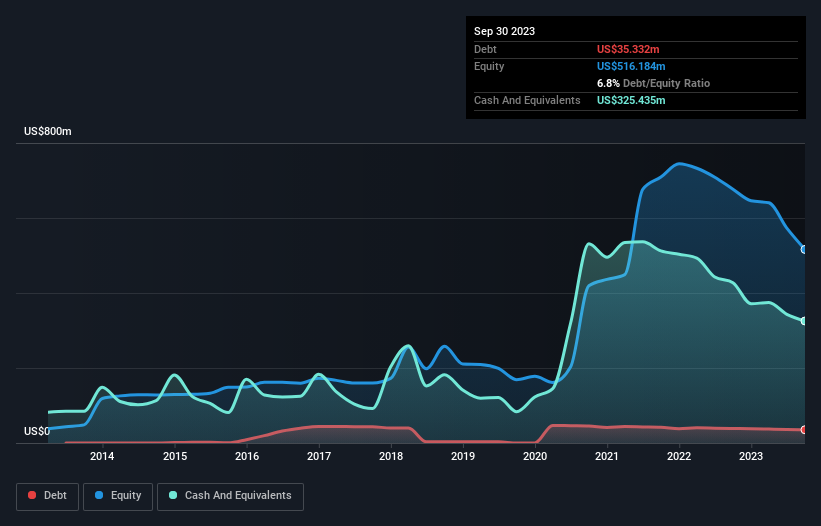- United States
- /
- Specialty Stores
- /
- NYSE:BBBY
Beyond (NYSE:BYON) Has Debt But No Earnings; Should You Worry?
Some say volatility, rather than debt, is the best way to think about risk as an investor, but Warren Buffett famously said that 'Volatility is far from synonymous with risk.' When we think about how risky a company is, we always like to look at its use of debt, since debt overload can lead to ruin. We can see that Beyond, Inc. (NYSE:BYON) does use debt in its business. But is this debt a concern to shareholders?
When Is Debt A Problem?
Debt is a tool to help businesses grow, but if a business is incapable of paying off its lenders, then it exists at their mercy. If things get really bad, the lenders can take control of the business. While that is not too common, we often do see indebted companies permanently diluting shareholders because lenders force them to raise capital at a distressed price. Of course, the upside of debt is that it often represents cheap capital, especially when it replaces dilution in a company with the ability to reinvest at high rates of return. The first thing to do when considering how much debt a business uses is to look at its cash and debt together.
Check out our latest analysis for Beyond
What Is Beyond's Net Debt?
You can click the graphic below for the historical numbers, but it shows that Beyond had US$35.3m of debt in September 2023, down from US$38.8m, one year before. However, it does have US$325.4m in cash offsetting this, leading to net cash of US$290.1m.

How Healthy Is Beyond's Balance Sheet?
We can see from the most recent balance sheet that Beyond had liabilities of US$209.4m falling due within a year, and liabilities of US$45.2m due beyond that. Offsetting these obligations, it had cash of US$325.4m as well as receivables valued at US$19.6m due within 12 months. So it can boast US$90.4m more liquid assets than total liabilities.
This short term liquidity is a sign that Beyond could probably pay off its debt with ease, as its balance sheet is far from stretched. Succinctly put, Beyond boasts net cash, so it's fair to say it does not have a heavy debt load! When analysing debt levels, the balance sheet is the obvious place to start. But it is future earnings, more than anything, that will determine Beyond's ability to maintain a healthy balance sheet going forward. So if you're focused on the future you can check out this free report showing analyst profit forecasts.
In the last year Beyond had a loss before interest and tax, and actually shrunk its revenue by 26%, to US$1.6b. To be frank that doesn't bode well.
So How Risky Is Beyond?
Statistically speaking companies that lose money are riskier than those that make money. And we do note that Beyond had an earnings before interest and tax (EBIT) loss, over the last year. And over the same period it saw negative free cash outflow of US$69m and booked a US$164m accounting loss. Given it only has net cash of US$290.1m, the company may need to raise more capital if it doesn't reach break-even soon. Overall, its balance sheet doesn't seem overly risky, at the moment, but we're always cautious until we see the positive free cash flow. The balance sheet is clearly the area to focus on when you are analysing debt. However, not all investment risk resides within the balance sheet - far from it. Case in point: We've spotted 1 warning sign for Beyond you should be aware of.
Of course, if you're the type of investor who prefers buying stocks without the burden of debt, then don't hesitate to discover our exclusive list of net cash growth stocks, today.
Valuation is complex, but we're here to simplify it.
Discover if Bed Bath & Beyond might be undervalued or overvalued with our detailed analysis, featuring fair value estimates, potential risks, dividends, insider trades, and its financial condition.
Access Free AnalysisHave feedback on this article? Concerned about the content? Get in touch with us directly. Alternatively, email editorial-team (at) simplywallst.com.
This article by Simply Wall St is general in nature. We provide commentary based on historical data and analyst forecasts only using an unbiased methodology and our articles are not intended to be financial advice. It does not constitute a recommendation to buy or sell any stock, and does not take account of your objectives, or your financial situation. We aim to bring you long-term focused analysis driven by fundamental data. Note that our analysis may not factor in the latest price-sensitive company announcements or qualitative material. Simply Wall St has no position in any stocks mentioned.
About NYSE:BBBY
Bed Bath & Beyond
Operates as an e-commerce affinity marketing company in the United States and Canada.
Good value with adequate balance sheet.
Similar Companies
Market Insights
Community Narratives




